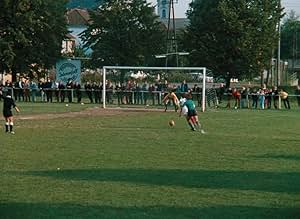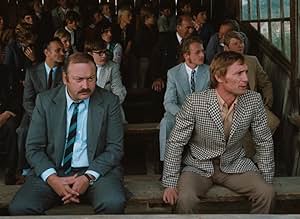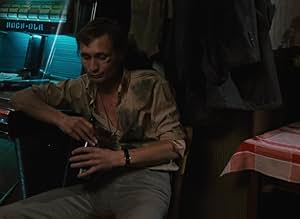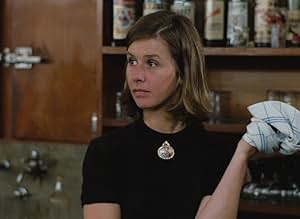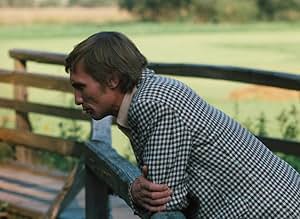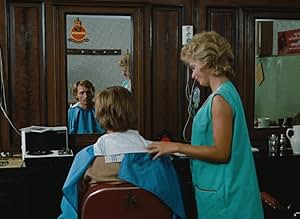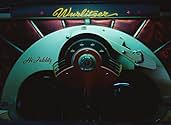El miedo del portero ante el penalti
Título original: Die Angst des Tormanns beim Elfmeter
- 1972
- 1h 41min
PUNTUACIÓN EN IMDb
6,5/10
2,5 mil
TU PUNTUACIÓN
Añade un argumento en tu idiomaGoalkeeper Josef Bloch is ejected during a game for foul play. He leaves the field and goes to spend the night with a cinema cashier.Goalkeeper Josef Bloch is ejected during a game for foul play. He leaves the field and goes to spend the night with a cinema cashier.Goalkeeper Josef Bloch is ejected during a game for foul play. He leaves the field and goes to spend the night with a cinema cashier.
- Dirección
- Guión
- Reparto principal
- Premios
- 1 premio en total
Monika Poeschl
- 1. Frisöse
- (as Monika Pöschl)
Reseñas destacadas
It is difficult to comment on such a brilliant movie without having read the book first, or even better, being familiar with Peter Handke's narrative works. While it may seem evident (to us, accustomed to Hollywood's conventional plots) that the main character of The Goalie... is a madman, it is not evident at all. Handke's approach to narrative is to reflect exterior signs, rather than enter the character's inner thoughts. See The Lefthanded Woman for example: while it may seem, on the surface, that the woman does not have a reason for divorce, in fact she might have a lot, only she does not reveal what is on her mind. Same applies to the goalie: he would not speak his mind, therefore we, and even Handke himself (or Wenders) can not enter his own intimate realm. Whatever his reasons are for what he does (and murder is only one of his unexplained acts) we can not know them. The film is about communication between people more than murder. It is funny that most of us would assume he is mad just because we can not find an account of his acts: if you think about it, in the real world outside the movie realm, most people -and even our closest friends- would not tell us why they do what they do. And it does not necessarily mean they are mad.
Huh that Wenders guy really knows how to make a good movie. Who would've thought...
Based on the novel "Die Angst des Tormannes beim Elfmeter" by Austrian existentialist writer, Peter Handke, The Goalie's Anxiety at the Penalty Kick is a powerful and unnerving film by the great German director Wim Wenders (Wings of Desire, Paris, Texas). As the film opens, the goalie, Joseph Bloch, (Arthur Brauss) is suspended from a soccer game in Vienna for missing a penalty kick. Seemingly not upset, he goes into town, then commits an unplanned and seemingly unmotivated murder of a cinema cashier.
Presenting us with a world that does not fit our picture of what constitutes rational behavior, Wenders refuses to explain the goalie's senseless action. Bloch simply continues his life in a matter-of-fact way, although a great deal of emotion seems to be churning under the surface. He retreats to a country inn to find his old girl friend. Nothing much happens. He goes to the movies, converses with the local residents, drinks a lot, gets into a fight, and ostensibly waits for the police to close in. His expression remains the same no matter what he is doing. As stated by Adam Groves in his review in The Cutting Edge, "He may be a homicidal sociopath, but Joseph seems to fit in quite well with the world around him, which seems to be the whole point"
Bloch talks about his life as a goalie throughout the film. At the end, he wanders into to a local soccer game and explains to a visiting salesman the thoughts that go through a goalie's mind during a penalty kick, for example, how the goalie must outguess the shooter. Perhaps dramatizing the dehumanizing effects of modern society, Goalie's Anxiety at the Penalty Kick is a strange, intriguing, and complex film that definitely deserves repeated viewing to unlock the puzzle. A possible hint involves a repetitive theme of a lost boy who drowned because he couldn't communicate.
Presenting us with a world that does not fit our picture of what constitutes rational behavior, Wenders refuses to explain the goalie's senseless action. Bloch simply continues his life in a matter-of-fact way, although a great deal of emotion seems to be churning under the surface. He retreats to a country inn to find his old girl friend. Nothing much happens. He goes to the movies, converses with the local residents, drinks a lot, gets into a fight, and ostensibly waits for the police to close in. His expression remains the same no matter what he is doing. As stated by Adam Groves in his review in The Cutting Edge, "He may be a homicidal sociopath, but Joseph seems to fit in quite well with the world around him, which seems to be the whole point"
Bloch talks about his life as a goalie throughout the film. At the end, he wanders into to a local soccer game and explains to a visiting salesman the thoughts that go through a goalie's mind during a penalty kick, for example, how the goalie must outguess the shooter. Perhaps dramatizing the dehumanizing effects of modern society, Goalie's Anxiety at the Penalty Kick is a strange, intriguing, and complex film that definitely deserves repeated viewing to unlock the puzzle. A possible hint involves a repetitive theme of a lost boy who drowned because he couldn't communicate.
Wim Wenders was always the most cerebral, the most cinematic of the three Giants of New German cinema (albeit Giants enough to bear favourable comparison even to cinematic Giants-For All-Ages such as Fritz Lang, and FW Murnau). In his hands, even a work so clearly of its maker as Ripley's Game became a perhaps even greater work, even more clearly of its maker such as The American Friend was, or as the Sam Shephard-scripted Paris, Texas was. And perhaps, too, this adaptation of a German bestseller likely is.
This film, despite the directors acknowledgements of the influence of Alfred Hitchcock - evident throughout - is A Masterpiece of control and content - admirable in a mature work by an established director, astonishing as a feature debut.
The title is relevant only in a later, casual, conversation the eponymous character has with a provincial policeman, where the policeman innocently spills out his m.o. when confronted by a criminal, but such is the nature of this study that we can't immediately be sure the psychopath is taking everything in. The murder itself isn't even shown in its grisly intensity, merely its foreplay and aftermath. And there's nothing to forewarn us of the killer's intentions: no taunting, no leering looks, no stalkings. (I saw parallels in the murder scene with a similar scene in Hitchcock's underrated 'Frenzy', but only in the way it was shot, and the aforementioned foreplay).
His scanning of every subsequent news report might suggest he's worried, that the noose is tightening around him. But his immediately subsequent actions suggest otherwise. Like the prototype psychopath, compassion is conspicuous by its absence from his every thought and action. But yet, in best cinematic tradition, what 'he' doesn't know is that we can see his every action, can scrutinise his every thought. Can condemn him for his indifference.
Only by giving every frame of this masterly film your full attention will you get to truly 'enjoy' its final frame.
The title is relevant only in a later, casual, conversation the eponymous character has with a provincial policeman, where the policeman innocently spills out his m.o. when confronted by a criminal, but such is the nature of this study that we can't immediately be sure the psychopath is taking everything in. The murder itself isn't even shown in its grisly intensity, merely its foreplay and aftermath. And there's nothing to forewarn us of the killer's intentions: no taunting, no leering looks, no stalkings. (I saw parallels in the murder scene with a similar scene in Hitchcock's underrated 'Frenzy', but only in the way it was shot, and the aforementioned foreplay).
His scanning of every subsequent news report might suggest he's worried, that the noose is tightening around him. But his immediately subsequent actions suggest otherwise. Like the prototype psychopath, compassion is conspicuous by its absence from his every thought and action. But yet, in best cinematic tradition, what 'he' doesn't know is that we can see his every action, can scrutinise his every thought. Can condemn him for his indifference.
Only by giving every frame of this masterly film your full attention will you get to truly 'enjoy' its final frame.
This is a detective film, but it's not really a film noir or cop drama like we're used to in the U.S. However, there are lots of references to America's overwhelming cultural presence throughout.
For me, Jurgen Knieper's score serves the story well; the tune still comes back to me all these years later.
It's a simple monotonous tune, the main parts being just two notes that the small chamber group works back and forth. It may not sound like much, but in reality it becomes mesmerizing, almost like a 2nd main character, and something that won't release you, like fate.
The film, of course, is genius.
The understated music matches the film's lack of much excitement or development.
The visuals and music work to produce a profoundly unsettling look at the monotonous life of the murderer.
For me, Jurgen Knieper's score serves the story well; the tune still comes back to me all these years later.
It's a simple monotonous tune, the main parts being just two notes that the small chamber group works back and forth. It may not sound like much, but in reality it becomes mesmerizing, almost like a 2nd main character, and something that won't release you, like fate.
The film, of course, is genius.
The understated music matches the film's lack of much excitement or development.
The visuals and music work to produce a profoundly unsettling look at the monotonous life of the murderer.
¿Sabías que...?
- CuriosidadesThe film remained unavailable for three decades for reasons of music rights. (The original soundtrack includes works of Elvis Presley and the Rolling Stones, which is more expensive than the production of the film itself. ) To make the film possible to view again, the director Wim Wenders obtains the right of several songs and replaces other pieces with new songs of lyrics. Those were produced using period instruments and analog techniques from the 1950s to imitate the sound of that time as faithful as possible.
- PifiasThe newspaper article "Heiße Spur im Mordfall Gloria T." (Firm lead in Gloria T. murder case) is actually a newspaper article about a car crash and has nothing whatsoever to do with the movie's plot. It seems that only the headline was changed for the purpose of filming.
- ConexionesFeatured in Motion and Emotion: The Films of Wim Wenders (1990)
Selecciones populares
Inicia sesión para calificar y añadir a tu lista para recibir recomendaciones personalizadas
- How long is The Goalie's Anxiety at the Penalty Kick?Con tecnología de Alexa
Detalles
- Fecha de lanzamiento
- Países de origen
- Idiomas
- Títulos en diferentes países
- The Goalie's Anxiety at the Penalty Kick
- Localizaciones del rodaje
- Empresas productoras
- Ver más compañías en los créditos en IMDbPro
Taquilla
- Presupuesto
- 620.000 DEM (estimación)
Contribuir a esta página
Sugerir un cambio o añadir el contenido que falta

Principal laguna de datos
By what name was El miedo del portero ante el penalti (1972) officially released in India in English?
Responde
